| Reviews & Columns |
|
Reviews DVD TV on DVD Blu-ray 4K UHD International DVDs In Theaters Reviews by Studio Video Games Features Collector Series DVDs Easter Egg Database Interviews DVD Talk Radio Feature Articles Columns Anime Talk DVD Savant Horror DVDs The M.O.D. Squad Art House HD Talk Silent DVD
|
DVD Talk Forum |
|
|
| Resources |
|
DVD Price Search Customer Service #'s RCE Info Links |
|
Columns
|
|
|
Hill Street Blues: The Complete Series
Shout Factory // Unrated // April 29, 2014
List Price: $199.99 [Buy now and save at Amazon]
The Show:
At last the wait is over! After Fox released the first season of Hill Street Blues in 2005, fans thought they'd soon be able to own the entire series on DVD, but that wasn't the case. Season Two was released in 2006 and then... nothing. At long last Shout! Factory has come to the rescue and released the entire series, all seven seasons and 144 episodes, in a 34-disc collection including a disc solely devoted to extras. This was on the top of my 'most wanted' list and I'm happy to report that the show is still as good as I remember it being.
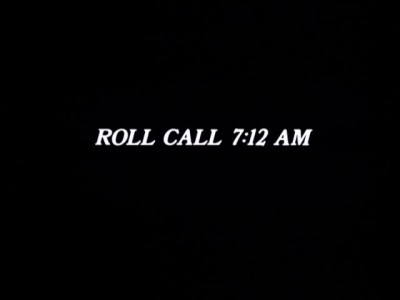
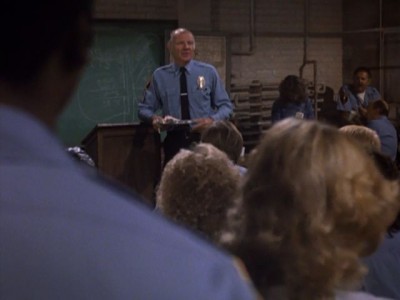
Hill Street Blues was truly a groundbreaking show. Running from 1981 to 1987, it influenced the face of television and was arguably the show that blazed the trail for the Second Golden age of Television. With smart scripts, complex plots, and adult themes, Hill Street was one of the very first night time dramas to give the audience credit for having some intelligence and showed the world in shades of grey rather than black and white.
It wasn't only the subject matter and how the creators dealt with it that was different, the way the whole atmosphere of the show was unlike anything else on TV at that point. The squad room was active and chaotic with hand-held cameras filming a lot of the action to give the show an authentic feel, it's almost like watching a documentary. Conversations were interrupted by criminals shouting as they are brought into the station and the cast of characters was so large viewers practically needed a score card to keep track. Typical shows of the time (both dramas and sitcoms) generally had two stories in any episode, an A plot which was the main story of the episode and the smaller B plot, both of which had a beginning, middle, and end. Everything was wrapped up by the time the credits rolled at the end. Hill Street expanded that. While there were usually two main stories, there would also be two or three or more plots that were not resolved by the show's end giving the program a lot of continuity and making it the 'must-watch' show of the era.
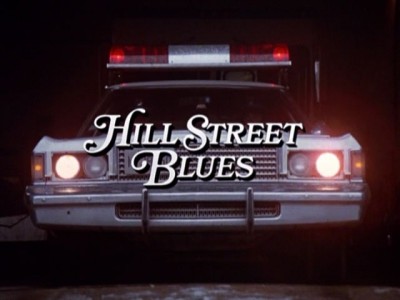
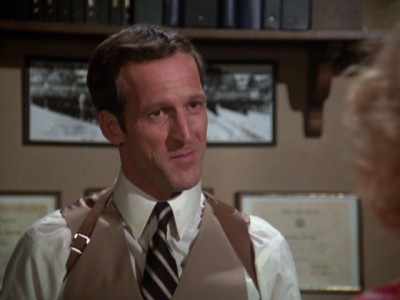
The show was incredibly successful too, proving that US viewers could follow complex plots and stories that unraveled over the course of weeks rather than minutes. Though it had a rocky start (the first season it earned the dubious honor of being the lowest rated show to ever be renewed... the rumor at the time was that the head of the networked liked it and personally saved it from the chopping block) but before long it gained a following among critics and regular viewers. The show ended up winning a long list of awards including a record setting four Emmys for Outstanding Drama Series (which has never been broken though three other series have equally the feat since then) as well as a total of 96 nominations. One year, every nomination for the Supporting Actor category was from the show... which was the only time that has ever happened.
The program revolves around the day-to-day activities in a police precinct in a large (unnamed) metropolitan city. Each episodes generally takes place over the course of a single day and opens part way through the morning roll call where Sgt. Phil Esterhaus (Michael Conrad) (and others later in the series) briefs the officers before sending them off with his daily warning "Hey! Lets be careful out there."
The station is governed, as much as it can be governed, by Captain Frank Furillo (Daniel J. Travanti) an honest, pragmatic officer who tries his best to handle the myriad situations that crop up during the day while maintaining some sort of order. Furillo is frequently pestered by his annoying ex-wife Fay (Barbara Bosson), as well as harangued by public defender Joyce Davenport (Veronica Hamel)... who he also dating. The station is filled with other cops including the undercover detective Mick Belker (Bruce Weitz), beat cops Andy Renko (Charles Haid) and Bobby Hill (Michael Warren), the sensitive Henry Goldblume (Joe Spano), the head of the SWAT team, Lt. Howard Hunter (James B. Sikking), the womanizing detective J.D. LaRue (Kiel Martin) and his suave partner Neal Washington (Taurean Blacque), along with the staff including the spunky Sgt. Lucille Bates (Betty Thomas), and Lt. Ray Calletano (Rene Enriquez). Others would join the some would leave over the years, the most notable addition being actor Dennis Franz who plays two different characters (at different times) over the course of the series.
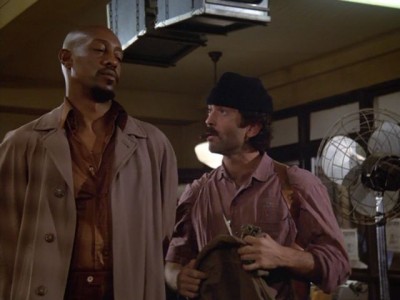
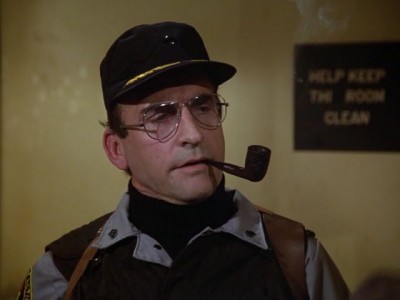
It might seem surprising with such a large cast, but the show is both character driven and plot driven in about equal measures. The various officers (and supporting cast) are fleshed out relatively quickly with sometimes intricate and detailed back stories and viewers quickly become attached to their favorites. Added to this mix are some pretty intense plots that often examine real-life problems (alcoholism, drug abuse, and inner-city violence to name just a few). The program also went to lengths to show both sides of a story and didn't always paint the cops in a good light. One of the best episodes from the series is the one that opened the third season, Trial by Fury. When a local church is broken into and an elderly nun is raped and brutally beaten, the local residents are furious. They demand that the police do something and do it quickly, so when a couple of hoods are caught trying to pawn items stolen from the church, they quickly arraign them for trial. The problem is, they may not have done it. They claim to have picked the loot up after someone running from the scene threw it in an alley. If they're released or charged with a lesser crime, a riot will break out? Should Furillo keep the peace and charge two possibly innocent men, or let his precinct erupt into violence?
The cast of the show is excellent across the board. There are several actors who are just brilliant in their roles, including Daniel J. Travanti, Veronica Hamel, and James B. Sikking, the last of which manages to make his serious character a source of comedy without turning him into a buffoon or comic relief. Even the smaller roles were populated by top-notch talent including Dennis Franz who played a short role before coming back as a regular cast member. (He then went on to win multiple awards for his work on NYPD Blue.)
Another thing that really helps the show is the attention to detail. The inner city sets are dirty and depressing and genuinely look like a bad part of town rather than an immaculate back lot with a couple of pieces of crumpled paper thrown on the street. The various denizens of the city look real too. The druggies look like scary addicts as opposed to buff actors with messed up hair. This realism, coupled with the steady-cam camera work gives the show a realist feel that really gives it some impact.
The show still holds up fairly well after all these years, though it is a little dated. The hair styles and clothes are the biggest thing that pop out (especially some of LaRue's outfits), but there are some other aspect that remind viewers that this is a show from an earlier time. There's an on-going joke in the first season concerning Esterhaus: He's in his mid 50's and he's thinking of marrying his girlfriend after she graduates... from high school. That would never fly today. In general however, the show still plays very well. It was even ahead of its time by having a homosexual character in a reoccurring role, and one that is portrayed in a compassionate light. The main difference viewing it today as opposed to when it first aired (which is when I originally saw the show) is that the look and feel of the show as well as the multiple intertwining story lines is no longer innovative and surprising. Back in the day this was cutting edge stuff, now everyone is doing it.
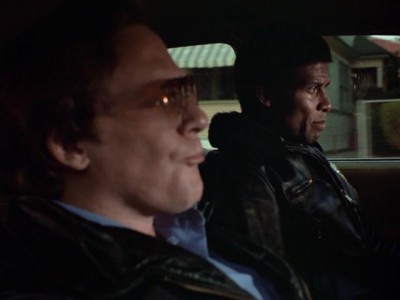
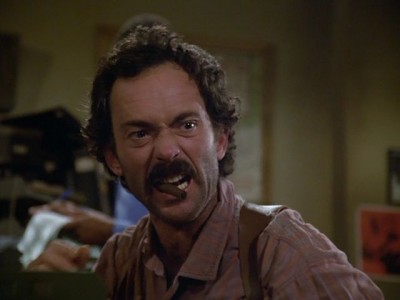
The show starts off on a high note and continues to deliver for most of its run. There are some bumps however. In the fifth season the balance between personal drama among the officers and the actual policing they did shifted in favor of the former. For example, Frank's ex-wife Fay gets a job in the station, which brought her into more episodes and caused more strife in the captain's life. While the show was still very good, it looses its' edge just a bit. At the end of the fifth season co-creator Steven Bochco (who started out writing for TV including Columbo and would later create both L.A. Law and NYPD Blue) was fired due to cost overruns (though it was reported at the time that since the show had enough episodes in the can to be syndicated, his bosses at MTM decided they didn't need to pay his high salary any more).
The show starts the decline in the sixth season. Several of the major characters left the show at the end of the previous season, and along with a largely new creative staff, the show had a different feel. The talented Dennis Franz was the sole addition to the cast at this time, but that back fired, at least in part. As mentioned earlier, he played a smaller role in several episodes earlier in the series. When he came back as a different character (with many of the same personality traits) it was almost an insult. The show always assumed its audience was smart and able to follow a twisting story; did the creators really think we wouldn't notice? Another problem was that after spending five full seasons with the original characters, it was hard to see them go. The show just didn't have the same punch that it did.
The seventh and final season is the weakest. It's still worth watching and it isn't bad by any means, but it was no longer 'GREAT!' it was just 'pretty good.' That would have been perfectly acceptable if it were any other show but this was Hill Street.
When all is said and done, Hill Street Blues is still one of the best dramas to ever air on television. It was quality television: smart, ground breaking, and totally engrossing. Now fans can finally binge watch the entire series. Life is good.
All seven seasons, 144 episodes in total, arrive in a massive 34-disc boxed set. As far as I could determine, these are the uncut, original episodes and not syndication prints. Each season gets its own single-width keepcase which holds the 4 or 5 discs that hold the episodes. The seven cases are housed in a sturdy, attractive slipcase.
Audio:
The show is presented with the original stereo soundtrack and the audio is generally clean. There is little, if any, separation between the speakers, but the dialog is easy to discern and the music sound fine. Nothing spectacular, but nothing bad either. The dubbed Spanish and French tracks that were included on the Fox releases of seasons one and two are not to be found here, but the set is Closed Captioned.
Video:
The 1.33:1 image is just so-so. The first two seasons seem to be identical to the earlier releases and the picture through the whole series about what you'd expect from an unrestored TV show from the 80's. The colors aren't as bright as they could be and the night scenes sometimes are a little too dark, but the detail is fine and there aren't any major defects. While I would have loved it if the show had been restored, that's just not a realistic dream. This is an older transfer that does the job well.
Extras:
There are four commentary tracks (the same ones included on the Fox releases) included for two episodes of season one (the pilot and I Never Promised You a Rose, Marvin) and a pair of shows from season two (The World According to Freedom and Freedom's Last Stand).
There's also a disc devoted to bonus features that has some pretty good content. First up is The History of Hill Street, a new documentary on the show that features interviews with the cast and crew who reminisce about the program and its creation. It last a little over an hour and is well worth watching.
Equally interesting is Writers on the Hill, a 20-minute talk with the scribes who penned the series including Steven Bochco, Jeffrey Lewis, Robert Crais and Alan Rachins. They talk about the difficulties writing in a group as well as sources of inspiration for some of the episodes. Roll Call: Looking Back on Hill Street Blues, the hour-long feature that was included with Fox's season one release is ported over too.
The extras are rounded out with some interviews with the cast including Dennis Franz (who talks about the differences in the two characters he played on the show, James B. Sikking, Bruce Weitz, Charles Haid, and Dennis Dugan (Captain Freedom), as well as a very short gag reel.
Final Thoughts:
Shows like The Sopranos, The Wire, and Breaking Bad owe a debt to Hill Street Blues. This was the show that started the trend towards more mature dramas on TV and it still plays well today. This is one of the very best TV dramas from the last century and it's great to have it all in one great set. If you enjoy engrossing, smart TV this is the set for you. It comes very Highly Recommended.
At last the wait is over! After Fox released the first season of Hill Street Blues in 2005, fans thought they'd soon be able to own the entire series on DVD, but that wasn't the case. Season Two was released in 2006 and then... nothing. At long last Shout! Factory has come to the rescue and released the entire series, all seven seasons and 144 episodes, in a 34-disc collection including a disc solely devoted to extras. This was on the top of my 'most wanted' list and I'm happy to report that the show is still as good as I remember it being.


Hill Street Blues was truly a groundbreaking show. Running from 1981 to 1987, it influenced the face of television and was arguably the show that blazed the trail for the Second Golden age of Television. With smart scripts, complex plots, and adult themes, Hill Street was one of the very first night time dramas to give the audience credit for having some intelligence and showed the world in shades of grey rather than black and white.
It wasn't only the subject matter and how the creators dealt with it that was different, the way the whole atmosphere of the show was unlike anything else on TV at that point. The squad room was active and chaotic with hand-held cameras filming a lot of the action to give the show an authentic feel, it's almost like watching a documentary. Conversations were interrupted by criminals shouting as they are brought into the station and the cast of characters was so large viewers practically needed a score card to keep track. Typical shows of the time (both dramas and sitcoms) generally had two stories in any episode, an A plot which was the main story of the episode and the smaller B plot, both of which had a beginning, middle, and end. Everything was wrapped up by the time the credits rolled at the end. Hill Street expanded that. While there were usually two main stories, there would also be two or three or more plots that were not resolved by the show's end giving the program a lot of continuity and making it the 'must-watch' show of the era.


The show was incredibly successful too, proving that US viewers could follow complex plots and stories that unraveled over the course of weeks rather than minutes. Though it had a rocky start (the first season it earned the dubious honor of being the lowest rated show to ever be renewed... the rumor at the time was that the head of the networked liked it and personally saved it from the chopping block) but before long it gained a following among critics and regular viewers. The show ended up winning a long list of awards including a record setting four Emmys for Outstanding Drama Series (which has never been broken though three other series have equally the feat since then) as well as a total of 96 nominations. One year, every nomination for the Supporting Actor category was from the show... which was the only time that has ever happened.
The program revolves around the day-to-day activities in a police precinct in a large (unnamed) metropolitan city. Each episodes generally takes place over the course of a single day and opens part way through the morning roll call where Sgt. Phil Esterhaus (Michael Conrad) (and others later in the series) briefs the officers before sending them off with his daily warning "Hey! Lets be careful out there."
The station is governed, as much as it can be governed, by Captain Frank Furillo (Daniel J. Travanti) an honest, pragmatic officer who tries his best to handle the myriad situations that crop up during the day while maintaining some sort of order. Furillo is frequently pestered by his annoying ex-wife Fay (Barbara Bosson), as well as harangued by public defender Joyce Davenport (Veronica Hamel)... who he also dating. The station is filled with other cops including the undercover detective Mick Belker (Bruce Weitz), beat cops Andy Renko (Charles Haid) and Bobby Hill (Michael Warren), the sensitive Henry Goldblume (Joe Spano), the head of the SWAT team, Lt. Howard Hunter (James B. Sikking), the womanizing detective J.D. LaRue (Kiel Martin) and his suave partner Neal Washington (Taurean Blacque), along with the staff including the spunky Sgt. Lucille Bates (Betty Thomas), and Lt. Ray Calletano (Rene Enriquez). Others would join the some would leave over the years, the most notable addition being actor Dennis Franz who plays two different characters (at different times) over the course of the series.


It might seem surprising with such a large cast, but the show is both character driven and plot driven in about equal measures. The various officers (and supporting cast) are fleshed out relatively quickly with sometimes intricate and detailed back stories and viewers quickly become attached to their favorites. Added to this mix are some pretty intense plots that often examine real-life problems (alcoholism, drug abuse, and inner-city violence to name just a few). The program also went to lengths to show both sides of a story and didn't always paint the cops in a good light. One of the best episodes from the series is the one that opened the third season, Trial by Fury. When a local church is broken into and an elderly nun is raped and brutally beaten, the local residents are furious. They demand that the police do something and do it quickly, so when a couple of hoods are caught trying to pawn items stolen from the church, they quickly arraign them for trial. The problem is, they may not have done it. They claim to have picked the loot up after someone running from the scene threw it in an alley. If they're released or charged with a lesser crime, a riot will break out? Should Furillo keep the peace and charge two possibly innocent men, or let his precinct erupt into violence?
The cast of the show is excellent across the board. There are several actors who are just brilliant in their roles, including Daniel J. Travanti, Veronica Hamel, and James B. Sikking, the last of which manages to make his serious character a source of comedy without turning him into a buffoon or comic relief. Even the smaller roles were populated by top-notch talent including Dennis Franz who played a short role before coming back as a regular cast member. (He then went on to win multiple awards for his work on NYPD Blue.)
Another thing that really helps the show is the attention to detail. The inner city sets are dirty and depressing and genuinely look like a bad part of town rather than an immaculate back lot with a couple of pieces of crumpled paper thrown on the street. The various denizens of the city look real too. The druggies look like scary addicts as opposed to buff actors with messed up hair. This realism, coupled with the steady-cam camera work gives the show a realist feel that really gives it some impact.
The show still holds up fairly well after all these years, though it is a little dated. The hair styles and clothes are the biggest thing that pop out (especially some of LaRue's outfits), but there are some other aspect that remind viewers that this is a show from an earlier time. There's an on-going joke in the first season concerning Esterhaus: He's in his mid 50's and he's thinking of marrying his girlfriend after she graduates... from high school. That would never fly today. In general however, the show still plays very well. It was even ahead of its time by having a homosexual character in a reoccurring role, and one that is portrayed in a compassionate light. The main difference viewing it today as opposed to when it first aired (which is when I originally saw the show) is that the look and feel of the show as well as the multiple intertwining story lines is no longer innovative and surprising. Back in the day this was cutting edge stuff, now everyone is doing it.


The show starts off on a high note and continues to deliver for most of its run. There are some bumps however. In the fifth season the balance between personal drama among the officers and the actual policing they did shifted in favor of the former. For example, Frank's ex-wife Fay gets a job in the station, which brought her into more episodes and caused more strife in the captain's life. While the show was still very good, it looses its' edge just a bit. At the end of the fifth season co-creator Steven Bochco (who started out writing for TV including Columbo and would later create both L.A. Law and NYPD Blue) was fired due to cost overruns (though it was reported at the time that since the show had enough episodes in the can to be syndicated, his bosses at MTM decided they didn't need to pay his high salary any more).
The show starts the decline in the sixth season. Several of the major characters left the show at the end of the previous season, and along with a largely new creative staff, the show had a different feel. The talented Dennis Franz was the sole addition to the cast at this time, but that back fired, at least in part. As mentioned earlier, he played a smaller role in several episodes earlier in the series. When he came back as a different character (with many of the same personality traits) it was almost an insult. The show always assumed its audience was smart and able to follow a twisting story; did the creators really think we wouldn't notice? Another problem was that after spending five full seasons with the original characters, it was hard to see them go. The show just didn't have the same punch that it did.
The seventh and final season is the weakest. It's still worth watching and it isn't bad by any means, but it was no longer 'GREAT!' it was just 'pretty good.' That would have been perfectly acceptable if it were any other show but this was Hill Street.
When all is said and done, Hill Street Blues is still one of the best dramas to ever air on television. It was quality television: smart, ground breaking, and totally engrossing. Now fans can finally binge watch the entire series. Life is good.
The DVD:
All seven seasons, 144 episodes in total, arrive in a massive 34-disc boxed set. As far as I could determine, these are the uncut, original episodes and not syndication prints. Each season gets its own single-width keepcase which holds the 4 or 5 discs that hold the episodes. The seven cases are housed in a sturdy, attractive slipcase.
Audio:
The show is presented with the original stereo soundtrack and the audio is generally clean. There is little, if any, separation between the speakers, but the dialog is easy to discern and the music sound fine. Nothing spectacular, but nothing bad either. The dubbed Spanish and French tracks that were included on the Fox releases of seasons one and two are not to be found here, but the set is Closed Captioned.
Video:
The 1.33:1 image is just so-so. The first two seasons seem to be identical to the earlier releases and the picture through the whole series about what you'd expect from an unrestored TV show from the 80's. The colors aren't as bright as they could be and the night scenes sometimes are a little too dark, but the detail is fine and there aren't any major defects. While I would have loved it if the show had been restored, that's just not a realistic dream. This is an older transfer that does the job well.
Extras:
There are four commentary tracks (the same ones included on the Fox releases) included for two episodes of season one (the pilot and I Never Promised You a Rose, Marvin) and a pair of shows from season two (The World According to Freedom and Freedom's Last Stand).
There's also a disc devoted to bonus features that has some pretty good content. First up is The History of Hill Street, a new documentary on the show that features interviews with the cast and crew who reminisce about the program and its creation. It last a little over an hour and is well worth watching.
Equally interesting is Writers on the Hill, a 20-minute talk with the scribes who penned the series including Steven Bochco, Jeffrey Lewis, Robert Crais and Alan Rachins. They talk about the difficulties writing in a group as well as sources of inspiration for some of the episodes. Roll Call: Looking Back on Hill Street Blues, the hour-long feature that was included with Fox's season one release is ported over too.
The extras are rounded out with some interviews with the cast including Dennis Franz (who talks about the differences in the two characters he played on the show, James B. Sikking, Bruce Weitz, Charles Haid, and Dennis Dugan (Captain Freedom), as well as a very short gag reel.
Final Thoughts:
Shows like The Sopranos, The Wire, and Breaking Bad owe a debt to Hill Street Blues. This was the show that started the trend towards more mature dramas on TV and it still plays well today. This is one of the very best TV dramas from the last century and it's great to have it all in one great set. If you enjoy engrossing, smart TV this is the set for you. It comes very Highly Recommended.
|
| Popular Reviews |
| Sponsored Links |
|
|
| Sponsored Links |
|
|
| Release List | Reviews | Shop | Newsletter | Forum | DVD Giveaways | Blu-Ray | Advertise |
|
Copyright 2024 DVDTalk.com All Rights Reserved. Legal Info, Privacy Policy, Terms of Use,
Manage Preferences,
Your Privacy Choices | |||||||














